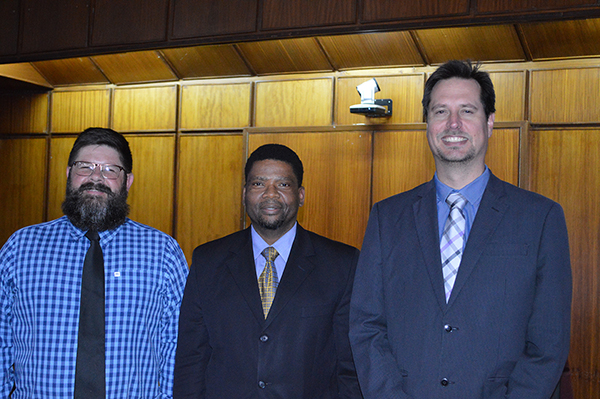The Faculty of Law and the Faculty of Humanities at the North-West University (NWU) jointly hosted the Artificial Intelligence (AI) Forum on the evening of Wednesday, 27 September.
The event centred around AI-generated knowledge and its implications for copyright, originality, and embodiment.
Among the speakers were Prof Dumi Moyo, executive dean of the Faculty of Humanities, Prof Wian Erlank from the Faculty of Law and Dr Jean du Toit, senior lecturer in the Faculty of Humanities. Prof Jeffery Mphahlele, deputy vice-chancellor for Research and Innovation, and Prof Mitzi Wiese, associate professor in the Law, Justice and Sustainability research unit, were the other speakers.
Prof Dumi Moyo gave the welcoming address. He emphasised the importance of bringing in more critical theories and legal lenses to analyse the implications of AI-generated knowledge in today’s fast-changing world.
“The rise of AI-generated knowledge has forced a redefinition of copyright laws, emphasising the need for recognition of human creativity for work to merit copyright. Advances in AI will continue to be perfected to a point where the distinction between work produced by humans and work produced by machines will become increasingly blurred,” Prof Moyo said.
According to Prof Wian Erlank, AI tools such as Microsoft Copilot, Google Bard, and ChatGPT are to be used, but we should not ignore them out of fear of the unknown. He went on to say that teaching an AI requires the use of extra training materials.
“In contrast to the Fourth Industrial Revolution, which acknowledged the significance of mainstream AI and automated decision-making, the effect of the new forms of generative AI may be indicative of the Fifth Industrial Revolution,” said Prof Erlank.
In addition, Dr Jean du Toit discussed freedom in an algorithmic future.
He says we cannot think ourselves outside algorithms because it shapes the dimensions of what we see in the world, but praising it raises concerns about the concept of freedom.
“There is a risk in speaking, in that we can be misunderstood. The tempting option of handing our conversations over to the algorithms is also available. When we do this, we simply decide to silence our own voices,” Prof Du Toit explained.
In his word of response Prof Jeffery Mphahlele urged the university to embrace AI.
“It is important that we address this issue. As an institution, we are not yet there, but we must develop legal measures that will enable us to use AI as effectively as possible,” he argued.
The delightful exchange of ideas ended when Prof Mitzi Wiese expressed her gratitude for having been there and thanked the organisers and everyone in attendance.
Artificial intelligence has been growing in recent years; we can maybe wish it away, but it is here to stay.

From the left Dr Jean du Toit, Prof Jeffery Mphahlele and Prof Wian Erlank.
